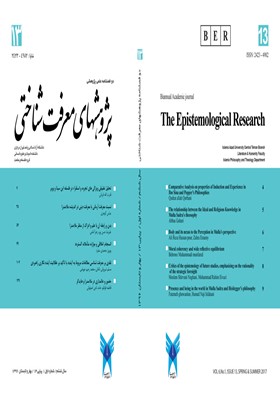انسجام اخلاقی و موازنه متأملانه گسترده
محورهای موضوعی : پژوهشهای معرفت شناختی
1 - استادیار دانشکاه تهران، گروه اخلاق و منابع اسلامی
کلید واژه: انسجام اخلاقی, توجیه باور اخلاقی, انسجام سطح گسترده, موازنه متأملانه گسترده, راولز,
چکیده مقاله :
در دهه های اخیر، شاهد سطحی از انسجام اخلاقی با عنوان موازنه متأملانه گسترده هستیم که از درجه اعتماد بالاتری نسبت به سطح محدود انسجام اخلاقی برخوردار است؛ زیرا برای توجیه یک باور اخلاقی، علاوه بر انسجام آن با باورهای اخلاقی دیگر، ضروری است آن باور اخلاقی با باورهای غیراخلاقی مناسب و مرتبط از قبیل باورهای روان شناختی، زیست شناختی، جامعه شناختی و انسان شناختی نیز منسجم باشد. آنچه اهمیت دارد این است که چنین سطحی از انسجام نیز با چالش هایی مواجه بوده و نسبت به نظریه رقیب، یعنی مبناگرایی اخلاقی موفق نیست. این نوشتار می کوشد پس از تبیین سطح گسترده انسجام اخلاقی، یعنی موازنه متأملانه گسترده، این رویکرد کلی را نقد کند. درنهایت روشن خواهد شد که اگر تصور شود یک باور اخلاقی در موازنه متأملانه گسترده، موجه است، اما این باور تنها به طور مسامحهای موجه است؛ یعنی تا این اندازه موجه است که فاعل دلیلی معرفتی برای پذیرش یا ردّ آن گزاره ندارد و لذا نمی توان آن را به طور معرفتی موجه دانست.
Recently, the wide reflective equilibrium can be considered consistent with the wide moral coherentism and seen to be more reliable than the narrow moral coherency in the ethics, since to justify the moral beliefs, in addition of coherency with the other ethical beliefs, they should be coherent to the related immoral beliefs such as psychological, biological, sociological and anthropological achievements. It is important that this level of coherency faced the challenges and has not provided better explanation than the fundamentalism to justify moral belief. In this article, after explaining the moral coherentism and wide reflective equilibrium, the general approach to the moral coherencies will be criticized. Finally, it will be clear that even if assumed that a moral belief in a wide coherency is justified, but this belief is justified only neglectfully, that which is meant that the agent has no epistemic reasons to accept or reject that propositions and therefore they cannot be justified epistemologically.
ریچارد، فومرتن. (1382). «نقدی بر انسجامگرایی»، ترجمه محمد سعیدی مهر، مجله نامه حکمت، ش1.
استرجن، اسکات (1390). «معرفت»، ترجمه امیر مازیار، در: آشنائی با فلسفه تحلیلی (معرفتشناسی)، تهران، انتشارات حکمت.
هولمز، رابرت ال. (1389). مبانی فلسفه اخلاقی، ترجمه مسعود علیا، تهران، انتشارات ققنوس.
Bonjour, Laurence (1985) The structure of Epistemic Knowledge, Cambridge university press.
Brandt, Richard (1979) A Theory of Good and Right, New York: Oxford University Press.
Brink, David (1989) Moral Realism and the Foundation of Ethics, New York.
Cotton, Matthew (2014) Ethics and Technology Assessment: A Participatory Approach, Volume 13 of Studies in Applied Philosophy, Epistemology and Rational Ethics, Springer.
Daniels, Norman, 1979, "Wide Reflective Equilibrium and Theory Acceptance in Ethics,"Journal of Philosophy 76(5) : 256-282.
Daniels, Norman, 2016, Reflective Equilibrium, www.plato.stanford.edu.
Depaul, Michael (1998) “why bother with reflective equilibrium?” In Michael R. Depaul and William Ramsey (eds.) Rethinking Intuition: The psychology of Intuition and Role in Philosophical Inquiry, Lanham, MD: Rowman and Littlefield, pp. 293-309.
Feldman, Richard, 2003, Epistemology, Upper Saddle River, New Jersey: Prentice – Hall.
Lehrer, Keith (1986) “The Coherence theory of knowledge”, Philosophical Topic.
----------- (1974) Knowledge, Oxford: Clarndon press.
Lyons, D. (1975) “The Nature and Soundness of Contract and Coherence Arguments”, in Danials, N., Reading Rawls, Oxford: Blackwell.
Mackie, John Leslie (1977) Ethics: Inventing Right and Wrong, New York: Penguin Books.
Mikhail, John (2011) “Rawls Concept of Reflective Equilibrium and its original function in Theory of Justice”, Wash. U. Jurisprudence Rev. 3, 1.
Rawls, John (1980) “ Kantian Constructivism in Moral Theory”, Journal of philosophy, 77(9), pp.515-72.
----------- (1971) A Theory of Justice, Cambridge. Harvard University Press.
Sayre – McCard, Geoffrey (2001) “ Coherentism”, in Encyclopedia of Ethics, eds., Lawrence c. Becker & charlotte B. Becker, New York: Routlege.
----------- (1996) “Coherentist Epistemology and Moral Theory”, In Moral Knowledge? New Readings in Moral Epistemology, eds., Walter Sinnott-Armstrong and Mark Timmons, New York: Oxford University Press.
Scanlon, T. M. (2003) “Rawls on Justification”, In Samuel Freeman, (ed.) The Cambridge Companion to Rawls, New York: Cambridge University Press, pp.139–167.
Sinnott – Armstrong, Walter (2006) Moral Skepticism, New York: Oxford University Press.
Sturgeon, Nicholas L. (2002) “Ethical Intuitionism and Ethical Naturalism”, in Philip Stratton-Lake (ed.), Ethical Intuitionism: Re-Evaluations, NewYork: Oxford University Press, pp.184-212.
----------- (2003) “Moor on Ethical Naturalism”, Ethics, 113(3), pp.528-556.
Singer, peter (1974) “Sidgwick and Reflective Equilibrium”, The Monist, 58 (3), pp.490-517.
_||_

